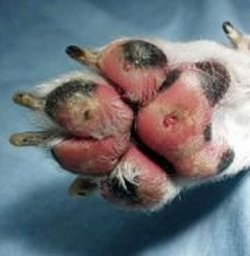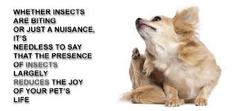Mild sunburn can be treated by bathing your dog with cool water and applying cool compresses. To soothe sunburned skin, use natural products such as witch hazel, aloe vera, shea butter or by breaking open vitamin E capsules and applying to the skin.
If your dog’s skin is red or raw, if there is blistering or if your dog seems to be in pain, he should be taken to the vet immediately.

Burned paws from hot pavement is another common danger in the summer months. Avoid by walking your dog early in the morning or later in the evening and not during the hours when pavement would be hottest. Whenever possible, let your dog walk on the grass, rather than the sidewalk.
Some signs that your dog’s paws may be burned are redness, licking of the paws and limping or refusing to walk. If you notice any of these signs, first aid should be started as soon as possible. Bathe the paws in cool water and try to keep the affected areas clean. You can try bandaging or putting socks on but supervise your dog to be sure he does not try to eat them. If the burns are serious your dog should be taken to the vet.

Another common problem in the summer is insect bites. Mosquito bites are generally not dangerous but some mosquitoes carry the heartworm virus so heartworm prevention is especially important in the summer months. The same goes for flea and tick prevention. An infestation of fleas or certain tick bites can cause serious illnesses in your dog and in some cases can even be deadly. Even if you use flea and tick prevention products it is best to check your dog frequently for fleas and ticks and treat as necessary.

Whipworms, roundworms, threadworms and other parasites are also more common in the summer as more time is spent outdoors where these parasites live. It is common for dogs to drink out of puddles or eat contaminated food off the ground, especially in summer months and once your dog is infected, some of these parasites can even be transmitted to humans so prevention and treatment are extremely important.
Symptoms may include bloody stools, diarrhea, weight loss, lethargy and anemia. Often parasites are difficult to eradicate and require multiple deworming treatments.

While summer is a great time to be outdoors and plan activities with your dog it is always important to take precautions to keep your dog safe. By using prevention methods and being aware of conditions and symptoms, your dog should be able to enjoy his favorite outdoor activities with minimal risk.





 RSS Feed
RSS Feed